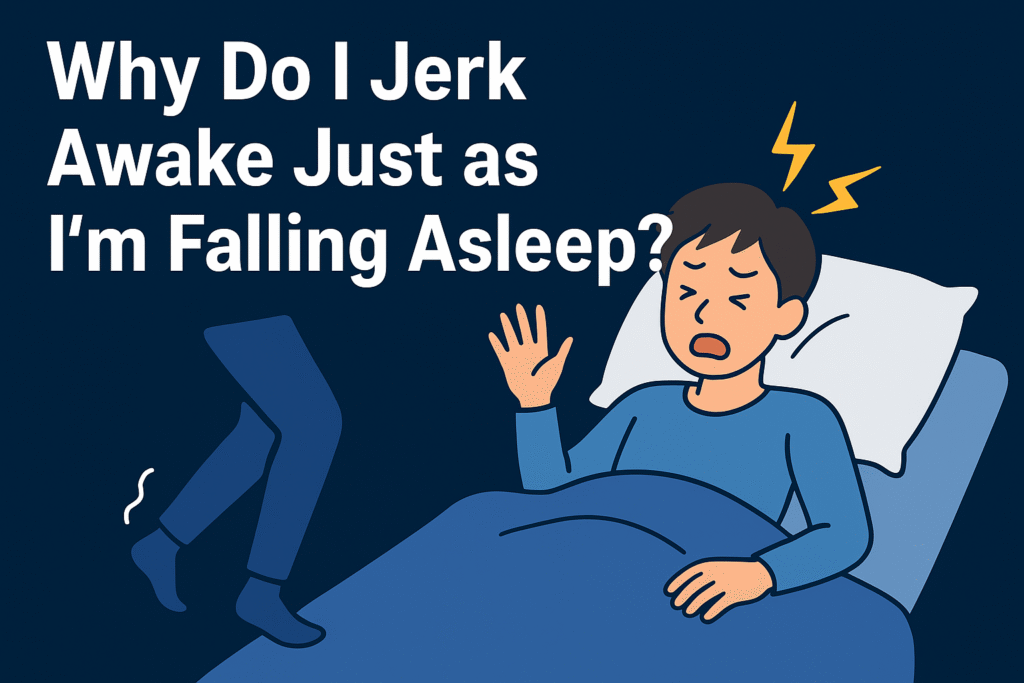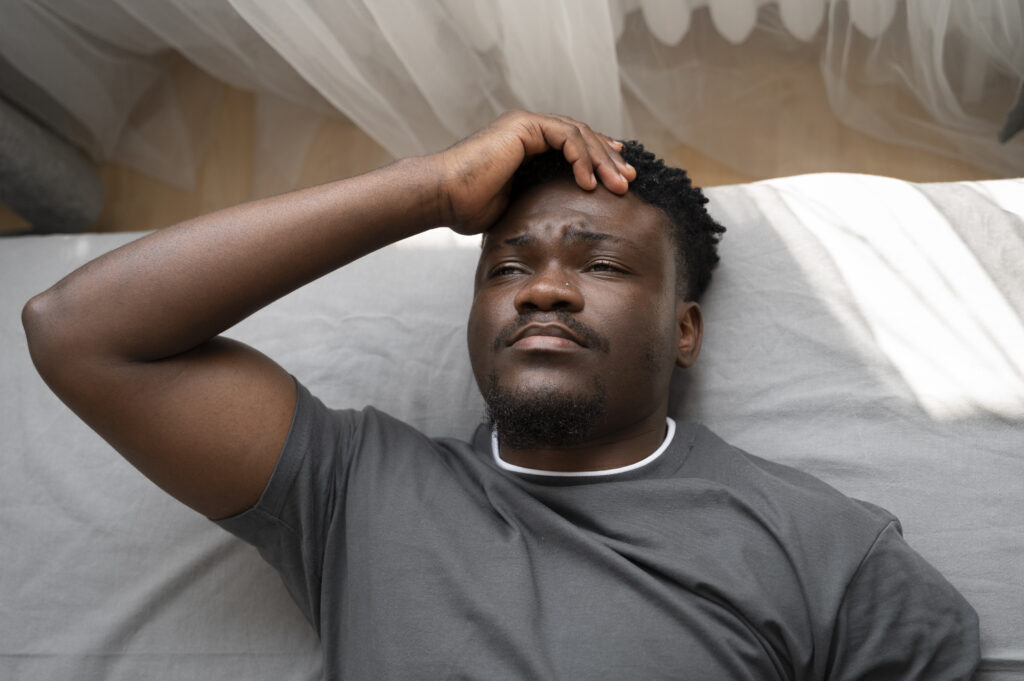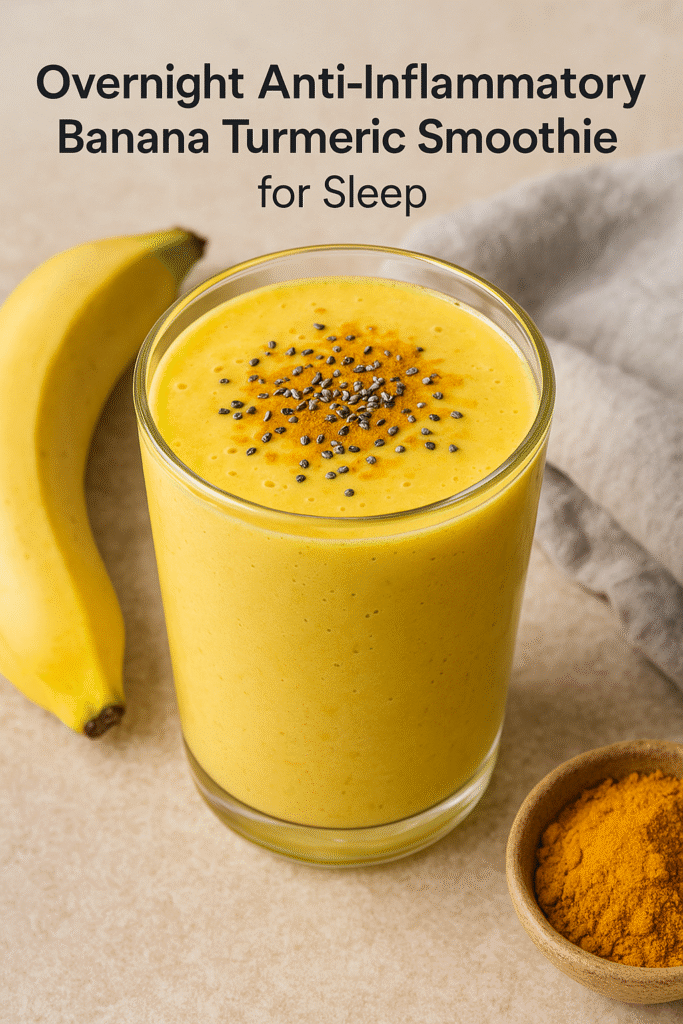
⚠️ Affiliate Disclaimer: This post may contain affiliate links, which means I may earn a small commission — at no extra cost to you — if you make a purchase through one of these links. I only recommend products or services I genuinely trust and believe can provide value. Thank you for supporting My Medical Muse!
Why Do I Jerk Awake Just as I’m Falling Asleep? 7 Powerful Facts You Must Know
Why Do I Jerk Awake Just as I’m Falling Asleep? Understanding Hypnic Jerks and Sleep Starts
Have you ever been drifting off into peaceful sleep when suddenly you jolt awake with a twitch, kick, or full-body spasm? Maybe it feels like you’re falling off a cliff, stumbling over a step, or even hearing a loud snap or crack inside your head. The moment is so sudden that your heart races, and for a second, you’re wide awake again.
If this sounds familiar, you’re not alone. Researchers estimate that up to 70% of people experience these nighttime spasms at some point in their lives. They may be occasional for some, but for others, they happen frequently enough to feel disruptive. The good news? For most people, they are completely harmless.
These mysterious sleep twitches are known as hypnic jerks, also called sleep starts or hypnagogic jerks. While they can be startling, they’re generally not a sign of illness or anything serious but what exactly is going on in your body when this happens? and why do some people experience them more often than others?
In this article, we’ll explore the fascinating science behind hypnic jerks, what triggers them, and whether there’s anything you can do to minimize how often they occur.
What Exactly Is a Hypnic Jerk?
A hypnic jerk is an involuntary muscle twitch or spasm that occurs right as you’re drifting off to sleep. It tends to happen in the first stage of sleep called N1 sleep, which is a very light stage where your body starts shutting down, but your brain hasn’t fully “let go” yet.
This twilight-like state between wakefulness and true sleep is known as the hypnagogic state, and it’s when the mind is most prone to odd sensations, vivid imagery, and sudden physical reactions.
Key features of hypnic jerks include:
- Sudden movement
Your arm, leg, shoulder, or even your whole body may twitch or spasm unexpectedly. Sometimes it’s so small you barely notice, other times it can feel like you’ve leapt off the bed. - Falling sensation
Many people report a distinct feeling of falling, tripping, or stumbling. Your brain briefly mistakes muscle relaxation for a loss of balance, which can trigger the “catching yourself” reflex. - Accompanied sensations
Some experience strange sensory effects along with the jerk. This can include hearing a sharp “pop” or “crack” (sometimes linked to exploding head syndrome), seeing flashes of light, or even experiencing a mini dream-like hallucination. - Startling effect
The jolt often wakes you back up, sometimes with a racing heartbeat, a quick gasp, or a moment of disorientation. It can feel unsettling, but within seconds, your body usually settles again.
While they can be a little scary in the moment, hypnic jerks are not dangerous. In fact, they’re so common that most sleep experts consider them a normal part of the transition into sleep.
Why Do Hypnic Jerks Happen?
Scientists haven’t pinned down a single cause for hypnic jerks, but several leading theories help explain why your body suddenly twitches just as you’re falling asleep. These theories highlight the fascinating interplay between your brain, nervous system, and evolutionary past.
1. Brain Miscommunication During Sleep Transition
When you start to drift off, your muscles loosen, breathing slows, and your body prepares to enter deeper stages of rest. At the same time, your brain is gradually shifting from wakefulness into light sleep. Sometimes, however, the brain misinterprets this normal muscle relaxation as a sign that you’re falling. In response, it sends out a rapid “jolt” signal to your muscles, almost like an emergency reflex designed to keep you upright. The result? A sudden twitch or full-body spasm.
2. Evolutionary Theory
Another popular explanation is rooted in our evolutionary history. In early human times, sleeping in trees or elevated areas may have been common. A sudden muscle twitch could have functioned as a protective reflex, jerking the body awake just in case you were about to roll off a branch or ledge. Today, we no longer need this survival mechanism, but the reflex may linger in our biology as a harmless remnant of the past.
3. Nervous System Overactivity
Your nervous system is like the electrical wiring of your body, constantly firing signals between your brain and muscles. When you’re stressed, anxious, overtired, or running on too much caffeine, that wiring can get overstimulated. Instead of smoothly powering down at night, your nervous system may fire off extra signals at the edge of sleep, causing an involuntary twitch.
4. Sleep Cycle Disruption
Hypnic jerks are also more likely if your body isn’t following its normal sleep rhythms. When you’re sleep-deprived, your brain tries to dive into sleep more abruptly than usual. This “hard landing” can create misfires in the brain’s communication with the body, leading to irregular muscle contractions as you nod off.
Common Triggers of Hypnic Jerks
Hypnic jerks can happen out of the blue, but certain lifestyle habits and health conditions make them more likely. Understanding your triggers can help you minimize how often they occur.
1. Stress and Anxiety
High stress levels keep your body in a state of hyper-alertness. When you finally try to relax at night, your nervous system may still be firing on overdrive. This makes sudden jerks more likely, especially if you go to bed feeling tense or worried.
2. Caffeine and Stimulants
Stimulants such as coffee, energy drinks, nicotine, and even some medications activate the nervous system and delay the onset of deep sleep. If you consume them too close to bedtime, you increase your chances of experiencing sleep starts.
3. Sleep Deprivation
When you don’t get enough sleep, your brain is forced to enter sleep more aggressively once you finally do lie down. This abrupt transition increases the likelihood of hypnic jerks because the body and brain aren’t easing into rest as smoothly as they should.
4. Intense Physical Activity
A tough workout close to bedtime can leave your muscles buzzing with activity. While exercise is great for sleep when done earlier in the day, going all-out late at night can overstimulate your muscles, leading to twitches as they finally try to relax.
5. Medications
Certain medications, particularly some antidepressants, stimulants, and drugs that affect brain chemistry, in which sleep starts as a side effect. If your jerks started or worsened after beginning a new prescription, it may be worth discussing with your doctor.
6. Other Sleep Disorders
Hypnic jerks aren’t inherently linked to sleep disorders, but they may appear more often in people dealing with conditions like sleep apnea, restless legs syndrome, or insomnia. These disorders fragment sleep and increase nervous system activity at night, which can make jerks more noticeable.
Are Hypnic Jerks Dangerous?
The short answer: NO, hypnic jerks are not dangerous. They may feel alarming, especially if they wake you up with a racing heartbeat but for most people, they are a normal and harmless part of the sleep process.
For the majority of sleepers, hypnic jerks are simply an occasional annoyance. They may startle you awake once in a while, but they don’t require medical treatment and rarely point to an underlying health problem.
That said, if hypnic jerks happen frequently, they can indirectly affect your sleep quality. For example, if you’re constantly waking up after a jerk, you may begin to:
- Struggle with insomnia: Finding it hard to fall asleep because you anticipate the jerk.
- Develop sleep anxiety: Worrying too much about bedtime and “fearing” the next twitch.
- Experience daytime fatigue: Feeling groggy, unfocused, or irritable from disrupted sleep.
In most cases, these effects are more about the anxiety surrounding hypnic jerks than the jerks themselves.
Rare but Possible Concerns
In very rare situations, frequent or particularly severe jerks may signal another condition, such as:
- Periodic limb movement disorder (PLMD): Repetitive muscle movements during sleep.
- Epilepsy: Although seizures and hypnic jerks are very different, some people confuse the two.
- Nerve or muscle dysfunction: Certain neurological conditions can trigger similar spasms.
If your hypnic jerks are accompanied by pain, breathing problems, frequent awakenings, or unusual neurological symptoms, it’s best to consult a doctor or sleep specialist. A professional evaluation can rule out other issues and give you peace of mind.
How to Reduce Hypnic Jerks Naturally
While you can’t completely eliminate hypnic jerks, they’re a natural reflex you can reduce how often they occur. The key is to help your body transition smoothly into sleep by calming your mind, muscles, and nervous system.
Here are some practical strategies:
1. Practice Relaxation Before Bed
- Try meditation, deep breathing, or progressive muscle relaxation.
- Journaling your thoughts can help clear your mind and reduce bedtime anxiety.
2. Limit Stimulants
- Avoid caffeine, nicotine, and energy drinks for at least 6-8 hours before bed.
- Swap them for calming herbal teas like chamomile, lavender, or valerian root.
3. Stick to a Consistent Sleep Schedule
- Go to bed and wake up at the same time every day, even on weekends.
- Limit daytime naps to 20-30 minutes, and avoid napping late in the afternoon.
4. Create a Sleep-Friendly Environment
- Keep your bedroom dark, cool, and quiet.
- Use blackout curtains, earplugs, or a white noise machine if needed.
5. Avoid Heavy Exercise Right Before Bed
- Schedule intense workouts earlier in the day.
- If you want evening movement, stick to light stretching, yoga, or a calming walk.
6. Limit Screen Time Before Bed
- The blue light from phones and computers suppresses melatonin, your sleep hormone.
- Aim for at least 1 hour of screen-free time before you go to bed.
7. Watch Alcohol Intake
- While alcohol can make you drowsy at first, it fragments your sleep later in the night.
- This disruption increases the likelihood of hypnic jerks and other sleep disturbances.
8. Talk to a Doctor About Medications
- If your jerks worsened after starting a new prescription, ask your doctor whether alternatives exist.
- Never stop or change medication without medical guidance.
Myths About Hypnic Jerks
Because hypnic jerks feel so dramatic, plenty of myths surround them. Let’s separate fact from fiction:
Myth 1: Hypnic jerks mean something is wrong with your brain.
False. They’re normal, harmless, and not linked to brain damage.
Myth 2: Hypnic jerks are seizures.
False. While they can resemble small spasms, hypnic jerks are not seizures and pose no risk of epilepsy.
Myth 3: Only people with sleep problems get hypnic jerks.
False. Even healthy sleepers with no underlying conditions can experience them.
Myth 4: You should never wake someone having a hypnic jerk.
False. It’s completely safe to wake someone up. At worst, they’ll be a little startled.
When to Seek Medical Advice
For most people, hypnic jerks are harmless and don’t require medical treatment, but there are situations where it’s worth speaking with a doctor or sleep specialist to rule out other issues.
You should seek medical advice if:
- Jerks happen nightly and cause chronic insomnia
If you’re lying awake for hours because you’re anticipating the next twitch, professional guidance can help break the cycle. - They’re accompanied by other symptoms
Loud snoring, choking, gasping for air, or restless leg movements may indicate an underlying sleep disorder such as sleep apnea or restless legs syndrome. - You notice daytime sleepiness, memory problems, or reduced focus:
Poor sleep quality can take a toll on your mood, attention span, and overall health. Persistent fatigue is a red flag that your sleep is being disrupted more than you realize. - You experience pain, numbness, or other neurological symptoms:
While rare, muscle jerks combined with unusual sensations may suggest nerve or neurological conditions that need attention.
In such cases, your doctor may recommend a sleep study (polysomnography), an overnight test that monitors your brain activity, breathing, and muscle movements while you sleep. This can help distinguish harmless hypnic jerks from other sleep-related conditions.
Interesting Facts About Hypnic Jerks
Beyond the science, hypnic jerks come with some fascinating quirks:
- They’re more common in children and young adults
Younger nervous systems tend to be more active and excitable, which may explain why jerks happen more often in early life. Still, they can occur at any age. - About 1 in 10 people experience them intensely enough to disrupt sleep
While occasional jerks are almost universal, only a small percentage of people struggle with them on a nightly basis. - Creative and imaginative people may experience more hypnic jerks
Research suggests that those with highly active minds, artists, writers, and innovators report jerks more frequently, possibly due to heightened brain activity during the transition to sleep. - Dreams can intensify the sensation
Hypnic jerks often tie into vivid dreams, especially those involving falling, tripping, or sudden motion. In these cases, the brain and body appear to be acting out the same reflex at the same time.
Final Thoughts
Jerking awake just as you’re falling asleep can be startling, but in most cases, it’s simply your brain and body adjusting during the transition into sleep. Hypnic jerks are common, natural, and usually nothing to worry about.
The most important thing is not to fear them. Instead, focus on habits that encourage smooth, restful sleep:
- Prioritize relaxation in the evening.
- Reduce stimulants like caffeine and nicotine.
- Create a calm, dark, and comfortable sleep environment.
- Keep a consistent sleep schedule.
If hypnic jerks continue to disrupt your nights or come with other concerning symptoms, a sleep specialist can provide reassurance and help identify any underlying issues.
At the end of the day, good sleep is a skill and the more you cultivate healthy bedtime habits, the easier it becomes to drift into deep, restorative rest without interruption.
👩⚕️ Need Personalized Health Advice?
Get expert guidance tailored to your unique health concerns through MuseCare Consult. Our licensed doctors are here to help you understand your symptoms, medications, and lab results—confidentially and affordably.
👉 Book a MuseCare Consult NowRelated Blog Post You Might Like:
- Why Do My Eyes Twitch Randomly? 12 Causes & Proven Everyday Fixes
- 15 Best Natural Foods for Clear Skin and Acne (Backed by Science)
- 15 Daily Habits That Quietly Kill Your Mental Health (And How to Stop Them)
- 15 Natural Remedies for Sore Throat That Work Fast and Effectively
- 15 Powerful Home Remedies for Constipation That Really Work


